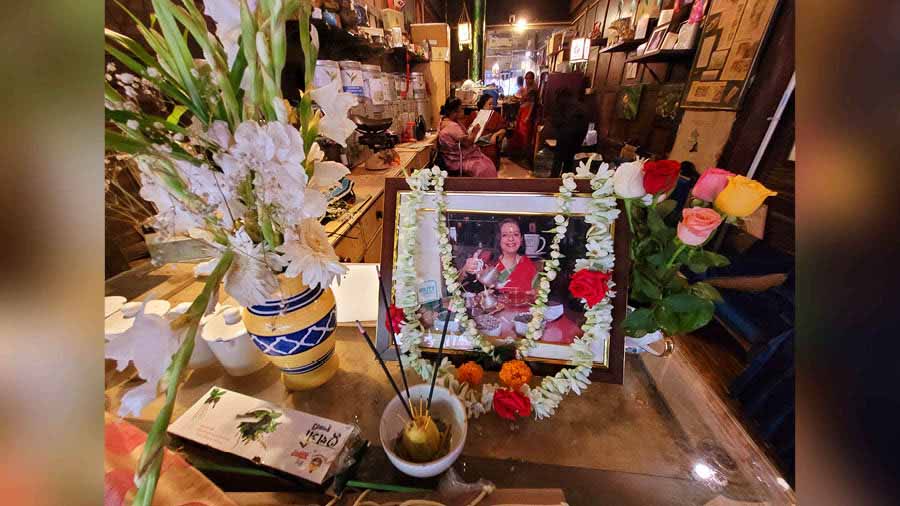The warm and homely air of Dolly’s Tea Shop has been tinged with the dim colours of grief and melancholy since April 21, the day Dolly Roy — proprietor of the cosy haunt in south Kolkata’s Dakshinapan — passed away.
Payel Sarkar, a 41-year-old sales executive, breaks the sombre calm of a Tuesday afternoon with flowers. The shop is suddenly abuzz. The roses that Sarkar has bought are neatly trimmed and arranged next to a garlanded photograph of Roy’s near the store’s glass entrance. Someone starts preparing tea. They do not stop to ask regulars what they want.
Like so many of Dolly’s frequent customers, Sarkar says the tea shop is her “second home”. Sometimes, when returning from business trips, she would come here straight from the airport. “Yes, I come here for the ice tea and the second flush, but to be honest, the tea is only an excuse,” smiles Sarkar. “The truth is if I don’t come here, my day feels incomplete. There have been days when I have come here twice. The love I have for Dolly’s Tea Shop is hard to describe. I come here when I am happy and when I am sad.” For Sarkar, Dolly’s is an “energy park”, a place she comes to whenever she can feel her spirit sag.
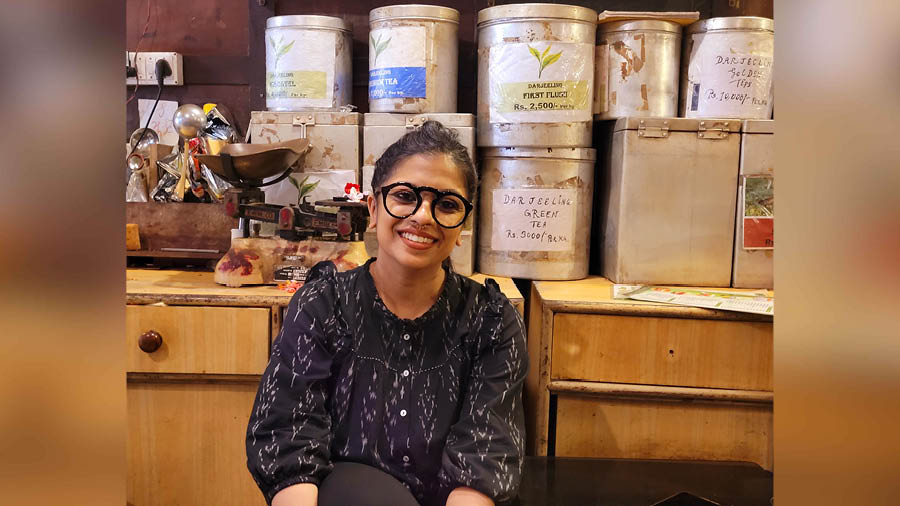
Payel Sarkar, who comes to Dolly’s Tea Shop almost every day, thinks of the store as her ‘second home’ Shreevatsa Nevatia
After having spent some time at Dolly’s, it soon becomes clear that Dolly Roy meant different things to different people. To Sarkar, for instance, she was a feminist lodestar: “She taught us how to survive and flourish in a male-dominated world.” Sujoy Dasgupta, an assistant professor of geology, recalls feeling scared of Roy when he first came here in 2003. “I was in my first year of college, and I would come here to date my then-girlfriend and now-wife. It was Ma’am who first broke the ice. She began keeping track of our lives. If she were here, she would tell you of my progress as a student and teacher.”
Making the case that Dolly’s has been “a cultural hub of south Kolkata” ever since it first opened its doors on February 3, 1988, Dasgupta feels that one can measure time by the growing fame of her customers. “In the 20 years that we’ve been regulars here, we have seen aspirants become celebrities.” Seeing Dolly’s always peopled by popular faces — actor and filmmaker Aparna Sen would come here at one time — Debashish Chakraborty assumed Dolly’s was “a costly establishment” when he first had ice tea here in 1994. “Since that day, I have only come to Dolly’s for my tea. I will not be able to tell you if there is another place like this in Kolkata, because I simply have not been anywhere else for 29 years.”
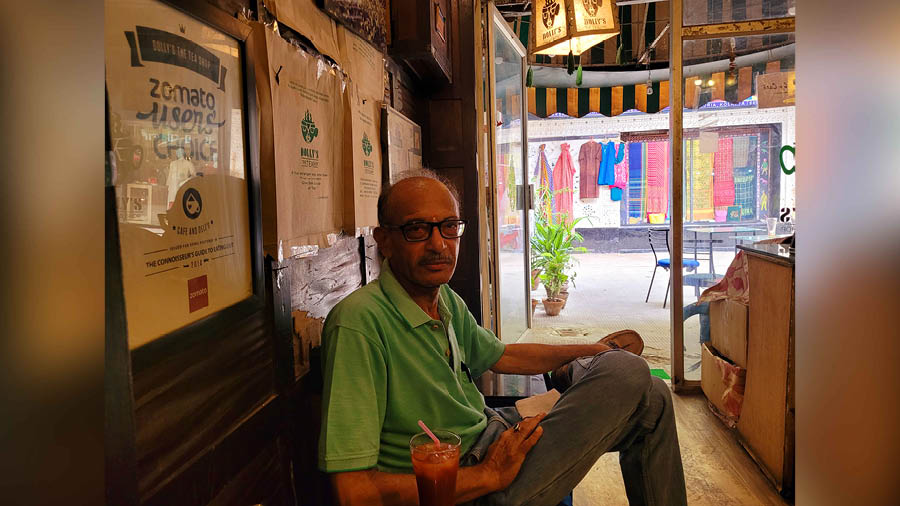
Debashish Chakraborty has been a regular at Dolly’s Tea Shop since 1994 Shreevatsa Nevatia
While Dasgupta credits Roy for his education in tea — “Thanks to Ma’am, we became tea snobs who only drink black tea”— Chakraborty remembers her as his “tea guide”. He says, “When I was not in Kolkata, I would know which tea I should or should not add milk to. It was she who taught me the difference between first and second flush.” Chakraborty works in the ceramic industry, and he thinks it fortunate that his office and Dolly’s Tea Shop have the same address — Dakshinapan Shopping Complex in Dhakuria. “I am always here, giving adda.” Used to spending long hours at Dolly’s, both Dasgupta and Chakraborty talk about how they have always felt welcome. Dasgupta says, “When we were young, we’d come here and sip our small Rs 10 ice teas for over an hour. No one shooed us away.”
Roy’s career is certainly the bedrock of her legacy. India’s first woman first tea-taster and the country’s first woman tea auctioneer, Roy cut her teeth as a Tea Board of India employee. In the 1970s, she travelled to the US and Europe as an ambassador of Indian tea. Sixty-nine when she passed away, Roy was only in her mid-thirties when she set up Dolly’s Tea Shop. The success of her enterprise is a sure testament to her entrepreneurial skills, but Dolly’s was always more than a straightforward commercial endeavour. Given the attachment that her clients feel to the store, and the affection with which they speak of it, it soon becomes apparent that Roy had earmarked for herself a corner of the world that was hers alone. In her life, Roy had not only nurtured a space, she had given Kolkata a new subculture.
For the price of love
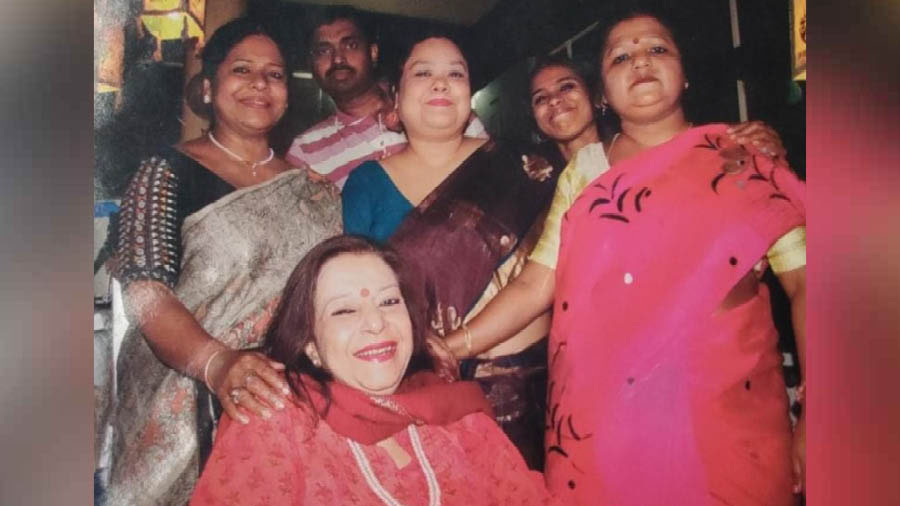
Dolly Roy (sitting) with members of the Dolly’s Tea Shop staff Shreevatsa Nevatia
Indrani Sen, manager of Dolly’s Tea Shop, first came to work here in 1992. “Dolly’s Tea Shop was the first tea boutique of its kind,” she says. “No one had thought that tea could be so well packaged. I can say this with some conviction — Dolly Roy was a pioneer. She started this culture of tea-drinking and others were quick to follow her lead.” Despite the burgeoning number of cafés and tea shops in the city, Sen feels it would be wrong to club Dolly’s with newer counterparts. “We don’t carry trays in high heels. That isn’t Dolly’s. People come here for its sense of community, and to buy and have good tea.”
Even though the Dolly’s menu was trimmed after the Covid pandemic, its options leave you staggered even today. The shop still serves a myriad variety of hot teas, everything from Darjeeling first flush and muscatel to ginger lemon and milk masala tea. The ice tea comes in fourteen flavours and the sandwiches — soft cheese, grilled ham and chicken sausage — all taste scrumptious. “Before the pandemic hit us in 2020, we’d stock 75-80 different kinds of tea. We also served French fries and pasta.”
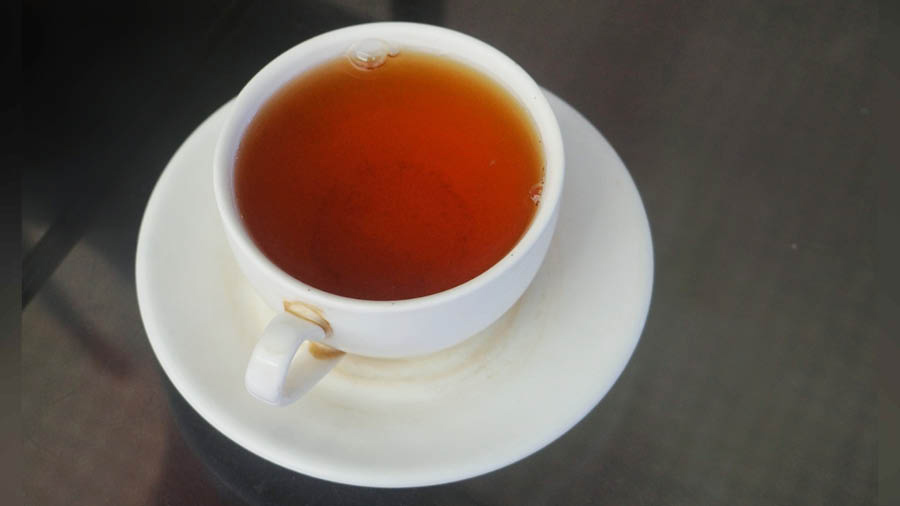
Dolly’s still serves a myriad variety of hot teas, everything from Darjeeling first flush and muscatel to ginger lemon and milk masala tea Soumyajit Dey
Sen goes further back in time to remember how customers at Dolly’s were always given the choice to taste the loose tea they were buying. “Didi had made preparation cards for every packet of tea. These explained how the tea should be made. We would put the tea in pretty pouches and boxes for our customers.” Over time, a Dolly’s tea bag came to be the preferred, more thoughtful gift her loyal clientele would buy for loved ones. “Didi would always tell me that innovation is the key to business.” Sen remembers the day Roy floated the idea of introducing food to her menu. “In the 1990s, shops in Dakshinapan didn’t have running water, but Didi wanted to ensure that foreigners could eat in a clean, hygienic way,” says Sen. “She spoke with such confidence that everyone, big or small, felt compelled to listen to her. In the end, it was her confidence, I feel, that removed several obstacles from her path.”
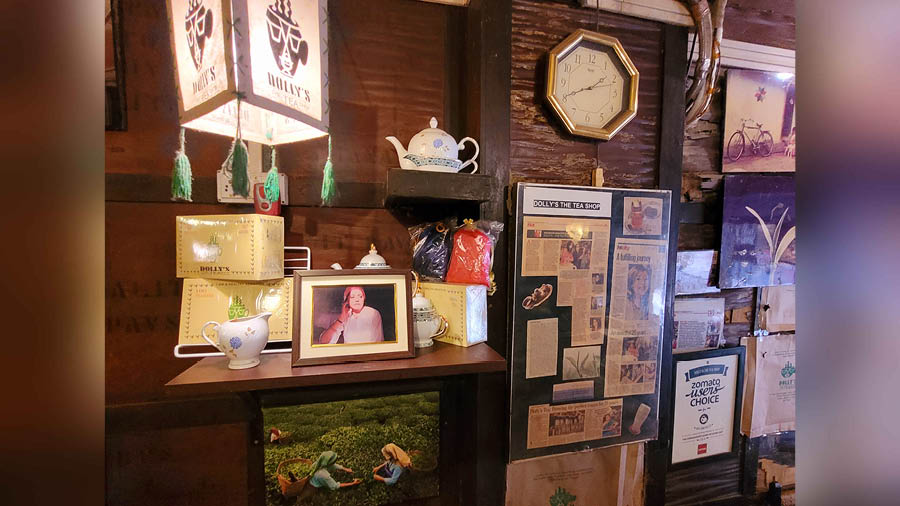
The wooden walls and paper lanterns have all been staple Dolly’s Tea Shop features since the store first opened its doors in 1988 Shreevatsa Nevatia
Roy, says Sen, had “a pleasant but strong personality”. Everyone, she adds, found it hard to say ‘no’ to her: “You could never disregard what she said and do as you please. Given the number of years we knew her, our respect for her is, of course, of another level.” Sen recalls Roy being able to plumb the depths of a person’s psychology by only looking at their face. “That was the level of her empathy.” When Sen’s husband died suddenly in 2009, Roy called her the next day to ask if she was taking her sleep medication. “A few days later, I had lost all my fight. I didn’t want to return to work. She told me that I must come to the store, even if it was for just an hour. ‘You will come to see me,’ she had said. Slowly, I resumed my duties at Dolly’s. She knew that my idle mind would only make my despair worse.”
Sen’s claim — “Didi was a pillar who taught so many of us women the value of being able to stand on our own two feet” — is corroborated by her colleagues. Anita Gomes, for instance, started work at Dolly’s in 1995. She says, “I did not know anything about tea but Didi taught me the trade like an elder sister would. She empowered us. She always stood by me and my family.” Before she came to work here in 2001, Ashima Das would help Roy with her domestic chores. Once she got married in 2007, Das quit her job at Dolly’s. “Four years later, I fell on hard times. When I came back to Didi, she said her doors were always open for me. She’d let me bring my two-year-old to work. Today, my daughter, Tanushka, is in Class X. I’d not have been able to raise her without Didi’s help. I know that for certain.”
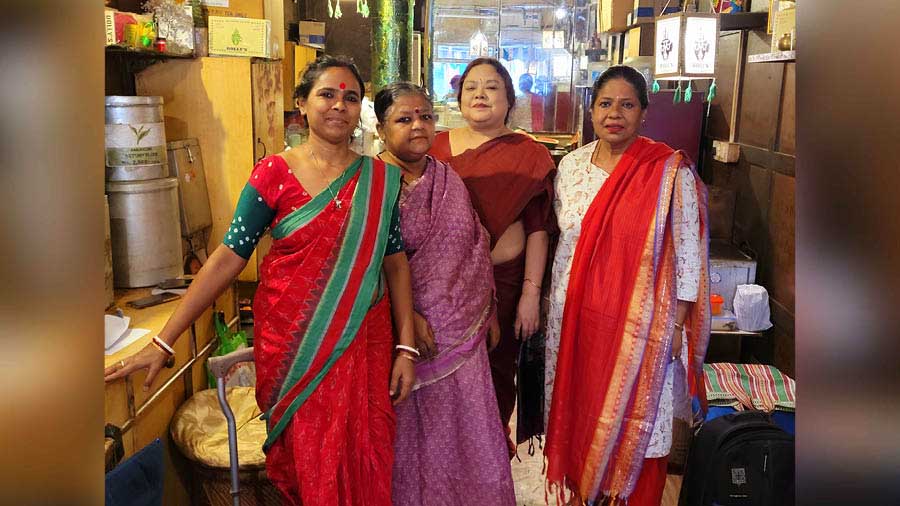
The staff at Dolly’s comprises (from left to right) Ashima Das, Lily Das, Indrani Sen and Anita Gomes Shreevatsa Nevatia
Lily Das has been working at Dolly’s for 23 years, but she says she has known Roy’s husband, Trinamool MP Saugata Roy, since her early days of working as a counting and polling agent. “I came to Boudi at a time our circumstances were dire. It was 2001 and my son was only four years old. I don’t know when and how it happened, but Boudi soon ensured I was financially sufficient.” As Lily laughs and reminisces about the times Roy scolded her and the occasions on which she got to pull her boss’ leg, Sen tells us, “Lily is a staunch Trinamool supporter, but some CPI(M) members come here and insist that they only want Lily’s tea. That only comes with love. We like to treat all our customers with the same affection.”
Through thick and thin
When Rituparna Sengupta heard of Roy’s demise last week, the communication consultant felt she had lost an integral part of her college years and youth. A regular at Dolly’s from the time she was an English literature student at Jadavpur University in 1998, Sengupta frequented the tea house often until she left the city in 2005. Speaking to My Kolkata from Delhi, Sengupta says, “Once we were done with college, we would visit Dolly’s. This was literally every evening, every weekday, from 5 pm to 7 pm.” If Roy hadn’t seen her the day before, she’d first ask, “Where were you? Did you get into trouble?”
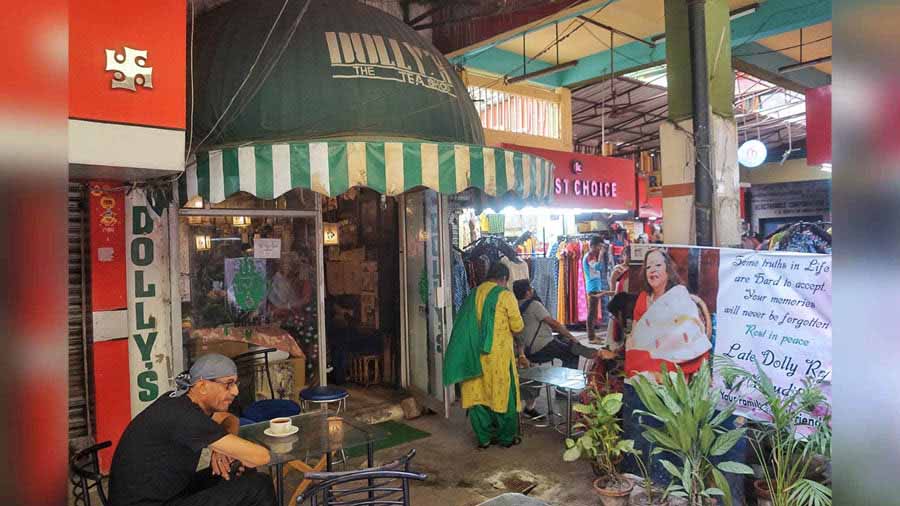
A board outside the shop pays tribute to its founder Soumyajit Dey
When Sengupta thinks of Roy, she sometimes thinks of her “crisp, starched and gorgeous” Tangail saris. “I never saw her have a bad sari day, not once. She felt like such a formidable presence when I first met her.” Over time, remembers Sengupta, “She became a part of us, a part of our conversations. We weren’t customers at her store anymore. She was one of us. She was a friend. She was always warm, funny and witty.” At times when Roy found her at Dolly’s with her then-boyfriend, she would go up to him and say something flattering about Sengupta. “It was like she was in my corner, like she was looking out for me. When I sat there by myself, she and I have had these massive life discussions. I was only 21 or 22 at that time, and she was my mother’s age, but, yet, she never made me mindful of that gap.”
Not once did Roy let Sengupta feel small by pulling out the hierarchy card. “She was never the owner of Dolly’s. We owned the place. I remember when they first installed an AC there, the joke was that we must have paid for it, because it was really us who lived there.” When Roy would see her walk in, she would already have ordered what Sengupta wanted to eat. “Sit quietly. I have ordered your ham sandwich and first flush,” she would tell her. Once, when she saw her enter the shop an hour and twenty minutes before an MA exam, Roy told Sengupta, “I will not entertain this rubbish. Please go and give your exam, Rituparna. Come back in the evening. I am feeling nervous just looking at you.”
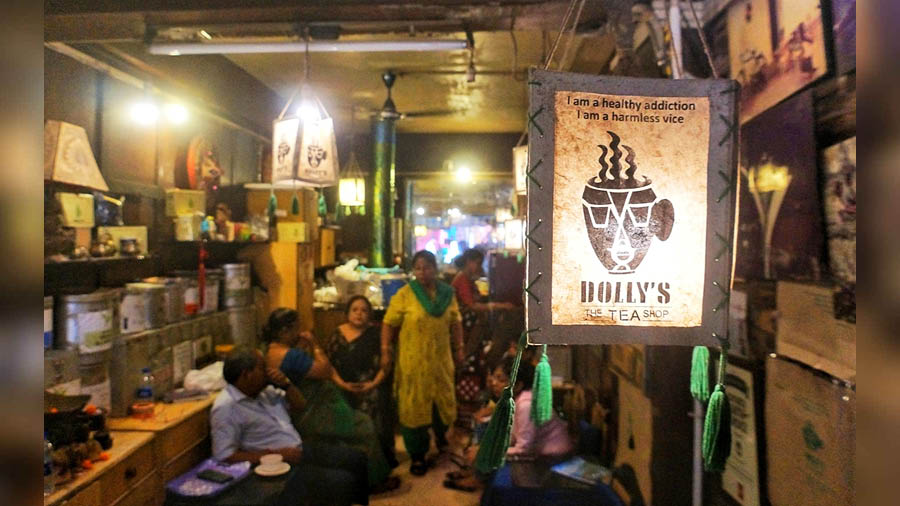
The cosy haunt in south Kolkata’s Dakshinapan Soumyajit Dey
For Sengupta, Dolly’s Tea Shop was “an extension of the Jadavpur lobby”, a place where she could meet like-minded people. “You never went to Dolly’s only for a cup of tea. It was always more about people interacting with each other. When I started volunteering in the development sector, a lot of my connections happened at Dolly’s. For me, the space was as educational as it was cultural.” Sengupta can recall various instances of her sitting on one of Dolly’s low stools and striking up conversations with strangers sitting across her. “You met so many people there that you would not be able to otherwise. It was a microcosm of Kolkata. I don't know how she tolerated us, but she did, and always with a smile.”
Media professional Debalina Mukhopadhyay has visited Dolly’s at least twice a week for the last 27 years. She, too, has found friends at the tea shop. Giving Roy the credit for the establishment’s ever-genial air, Mukhopadhyay says, “Dolly Di always met you with a smile. She would give me tea to take home for my father. She would always ask after my mother. She would always say she was there for me.” The last time Mukhopadhyay saw Roy, the Dolly’s proprietor was in a wheelchair because of her ill health. “I lost my mother a year and a half ago, and I would sometimes go to Dolly’s only to cry. I am not sure what happened, but when I saw Dolly Di, I instantly started weeping. She consoled me repeatedly. I don’t know why I broke down like that, but today I feel I bid her farewell with those tears.”
